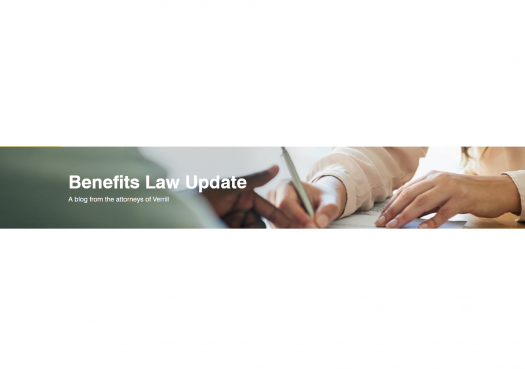Category: Fiduciary Duties
Health and Welfare Benefit Plan Fiduciary Governance in the Wake of the Johnson & Johnson Lawsuit
For the past few years, we have encouraged plan sponsors to focus on matters of fiduciary governance for their health and welfare benefit plans ( see our 2021 blog post ). Yet many plan sponsors overlook the fact that the fiduciary standards of ERISA apply equally to retirement plans...
The Department of Labor Proposes Its New Fiduciary Rule
On October 31, 2023, the Department of Labor published a new proposed regulation (the “ Proposed Rule ”) defining “investment advice” for purposes of determining when someone advising an ERISA plan or participant or an IRA owner is a fiduciary. The Department’s latest proposal is designed to avoid court...
Update on the Debate over Environmental, Social, and Corporate Governance Investing
The debate over investment of retirement plan funds based on environmental, social, and corporate governance (“ESG”) factors continues to make waves. This post provides a high-level overview of the current state of play for plans that are subject to ERISA. We last wrote about this topic in October 2021...
Reasonable Compensation Under ERISA: Thoughts on Two Recent Cases
Two recent court decisions bring into focus two seldom-asked questions about the reasonable compensation requirement under ERISA. When must an ERISA plan’s service provider compensation be reasonable? And why shouldn’t a plan fiduciary be able to receive reasonable compensation from the plan even if the fiduciary had a hand...
Gag Clauses – New Guidance and Litigation Will Inform Compliance
Certain provisions of the Transparency in Coverage Final Regulations and the Consolidated Appropriation Act, 2021 (“CAA”) require group health plans and/or their vendors to report information to federal agencies. On December 31, 2023, group health plans will have to provide an attestation concerning compliance with the prohibition on gag...
Unanimous Supreme Court Overturns Court of Appeals in Northwestern University 403(b) Plans Excessive Fee Case
The United States Supreme Court has agreed with participants in two 403(b) plans sponsored by Northwestern University that their lawsuit, alleging that plan recordkeeping and investment fees were excessive, should not have been dismissed. On January 24, 2022, the Court sent Hughes v. Northwestern University (Jan. 24, 2022) back...
Thoughts on the DOL’s Proposed ESG Regulation

The latest installment in the regulatory back-and-forth over the investment of ERISA-governed retirement plan assets based on environmental, social, and corporate governance (“ESG”) factors arrived on October 14, 2021 in the form of a newly proposed regulation on “ Prudence and Loyalty in Selecting Plan Investments and Exercising Shareholder...
Recent Court Decisions Extend the Statute of Limitations for Breach of Fiduciary Duty Lawsuits under ERISA
ERISA Fiduciary Duties and Liability Under the Employee Retirement Income Security Act of 1974, as amended (“ERISA”), a plan fiduciary must (i) act prudently, for the exclusive purposes of providing benefits to plan participants and defraying plan expenses, and in accordance with plan documents, and (ii) invest plan assets...
Do You Understand Your Investment Policy Statement?
The Acme Rocket Sled Company Retirement Plan Administration Committee recently selected a new investment advisor for the company’s 401(k) plan. During the RFP process, the new advisor observed that the Investment Policy Statement (IPS) that the committee adopted many years ago was a bit thin and out of date...
DOL Cybersecurity Guidance
This post provides a high-level summary of the Department of Labor’s cybersecurity guidance issued in April and identifies actions retirement plan sponsors and other plan fiduciaries should consider taking now in light of the guidance and the fact that the DOL has started sending information requests under an audit...
Understanding Your Fiduciary Responsibilities Under ERISA: A Webinar
Employers have long understood the importance of fiduciary compliance with respect to 401(k) plans and other retirement plans subject to ERISA, and most have sound processes and governance structures in place to ensure the fulfillment of their fiduciary duties. Many employers, however, do not apply the same level of...
Pension Plan Mortality Table Litigation – What’s Next?
The first major settlement of a lawsuit challenging the mortality assumptions used to calculate pension plan benefits was announced earlier this year. According to court filings in Cruz v. Raytheon Company , the settlement will be worth about $59.2 million to more than 10,000 retirees and surviving spouses in...
ESG Ping-Pong®
The recent regulatory back-and-forth over the investment of ERISA-governed retirement plan assets based on environmental, social, and corporate governance (“ESG”) factors has demonstrated that ESG investing will remain under an intense spotlight for some time to come, and the rules can change quickly. As a result, investment fiduciaries should...
Identifying Plan Assets in ERISA Health & Welfare Plans
Last month, we advised readers of this blog to consider efforts to formalize the fiduciary governance of their health and welfare benefit plans. In that post , we described some of the reasons that employers have historically paid more attention to fiduciary compliance for retirement plans than health and...
Establish an Administrative Committee for Your ERISA Health and Welfare Benefit Plans
The fiduciary standards of ERISA apply to all employee benefit plans that are subject to Title I of ERISA. The duty of loyalty, the duty of prudence, and the duty to administer a plan in accordance with its written terms apply equally to “employee welfare benefit plans” and “employee...
Employee Benefits & Executive Compensation 2020 Year-End Client Advisory

Click here to view as a PDF . This Client Advisory highlights important developments in the law governing employee benefit plans over the past year. It offers insight into what these developments mean for employers and plan sponsors and previews developments we expect to see in 2021. The following...
Target Date Funds: Are You Asking the Right Questions?
Eight years ago, the U.S. Department of Labor (“DOL”) issued “tips” for retirement plan fiduciaries to consider when selecting and monitoring target date retirement funds (“TDFs”). At the time, the DOL noted that TDFs were becoming “increasingly popular.” Who could have predicted how popular? Earlier this year, Barron’s magazine...
Supreme Court Declines to Address Pleading Standards in Stock-Drop Litigation - Retirement Plans Committee of IBM v. Jander
On November 9, 2020, the Supreme Court declined to consider an appeal from the Second Circuit Court of Appeals in Retirement Plans Committee of IBM v. Jander , leaving unresolved for now questions about the specificity required by the “more harm than good” pleading standard in stock drop litigation...
DOL Proposed Regulation Highlights the Risks of ESG Investing for ERISA Fiduciaries
On June 23, 2020, the U.S. Department of Labor (“DOL”) issued a proposed regulation outlining the duties of an ERISA fiduciary when considering an investment that incorporates environmental, social, and corporate governance (“ESG”) factors. [1] Some believe that the DOL will likely move quickly to finalize the regulation before...
Supreme Court Holds Pension Plan Participants Lack Standing to Sue Fiduciaries for Breach of Duties
In Thole v. U.S. Bank , a 5-4 Supreme Court decision issued on June 1, the Court held that retired participants in a defined benefit pension plan lack constitutional standing to sue the plan fiduciaries for alleged breach of their ERISA fiduciary duties. What was key for the Court’s...
Supreme Court: written disclosures not enough to show actual knowledge in ERISA suits
The United States Supreme Court unanimously decided last week that a plan participant who received written disclosures about the plan’s investments, but does not remember reading them, does not necessarily have “actual knowledge” of the content of the disclosures. This is important because ERISA imposes a shorter statute of...
Supreme Court – Updates for 2020
We are barely two months into the new year and already there are significant updates to the 2020 Supreme Court Preview included in our December 2019 Client Advisory (available here ). Below are updates regarding the employee benefit cases before the Court previously mentioned in our Advisory: IBM v...
DOL Proposes New Electronic Disclosure Rules for Retirement Plans

At long last, the Department of Labor (DOL) has issued an update to its safe harbor rules governing electronic distributions of retirement plan disclosures. When finalized and adopted, the new safe harbor rules will update guidance that has been in place since 2002. The new rules do not apply...
December 2018 Client Advisory
This Client Advisory, originally distributed in December 2018, highlights important developments in the law governing employee benefit plans and executive compensation over the past year. It offers insight into what these developments mean for employers and plan sponsors and previews developments we expect to see in 2019. The following...
Join Us for Managing 401(k) Plan Fiduciary Risk on 11/8
In today's ever-changing and challenging 401(k) environment, plan sponsors find themselves in a new and seemingly complex environment. Regulations are becoming increasingly complicated, the number of class action lawsuits continues to rise, and employees insist on access to less expensive options with better performance, without understanding what the fees...
Stronger Than Its Weakest Links: NYU Survives 403(b) Fee Lawsuit
In the first University 403(b) plan fee case to proceed to trial, Sacerdote v. New York University (No. 16-cv-6284 (KBF) (S.D.N.Y. July 31, 2018), the Court found that plaintiffs were unsuccessful in proving that the NYU Retirement Plan Committee breached its fiduciary duties by failing to reduce high recordkeeping...
Socially Responsible Investing and the Plan Fiduciary
In the wake of mass shootings, environmental disasters, industrial accidents, drug and tobacco use pandemics, and other tragedies, retirement plan investors are paying more attention to selecting or rejecting investments based on perceived public policy benefits or detriment. For example, investors are more focused than ever on the larger...
Fifth Circuit Vacates DOL Conflict of Interest Fiduciary Rule
The Fifth Circuit vacated the Department of Labor's long-suffering conflict of interest rule (commonly referred to as the "fiduciary rule"), holding that the rule exceeds the scope of DOL's regulatory authority. The decision means that the expanded definition of fiduciary, the elevated standards of conduct for certain investment advisors...
Time is Running Out – New Disability Claims Procedures Take Effect April 2, 2018
It has been a long time coming, but the Department of Labor's final rule regarding disability benefit claims procedures (the "Final Rule") will finally take effect on April 2, 2018. Employers need to determine which of their ERISA plans will be subject to the Final Rule and implement the...
Dismissal of Case Against UPenn Good News for 403(b) Plan Sponsors
Colleges and universities have finally received some encouraging news in the recent spate of class action suits against higher education 403(b) plans. Last week a federal judge dismissed all claims against the University of Pennsylvania, marking the first time that one of these recent law suits has been be...
Page 1 of 2









